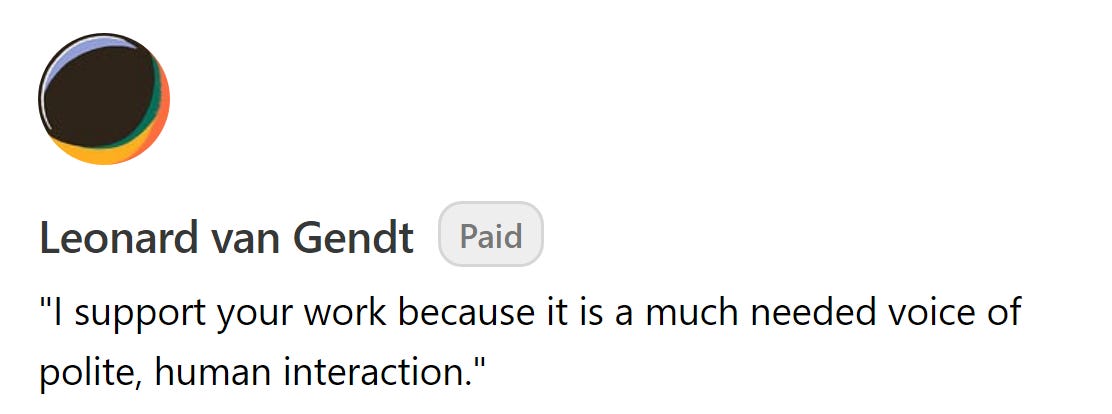John Pavlovitz details why the Kamala Harris vs Donald Trump Presidential Race is so close.
Writer, pastor, activist, & storyteller John Pavlovitz recently pointed out the core reasons why the Kamala Harris vs Donald Trump presidential race is so close.
THANK YOU IN ADVANCE FOR YOUR SUPPORT! We are feverishly working triple time to ensure we win this existential election.
We are grateful for our Paid Subscribers and Free Subscribers. In this political climate, we need several hundred more Paid Subscribers. Misinformation funded by the deep pockets of our Oligarchy floods the internet. We are using all our platforms on-air, online, and in publications to counter that. We ask that you invest the equivalent of less than a coffee to ensure we can keep doing this effectively. Please invest in a Democracy that serves all of us by becoming a paid subscriber. It comes with many benefits.
John Pavlovitz: Why is the presidential race close?
In a candid and insightful interview, John Pavlovitz, the influential pastor, writer, and activist, delves into the complexities of the 2024 Presidential Election, a surprisingly close race between Kamala Harris and Donald Trump. Pavlovitz’s analysis not only reflects on the American electorate but also shines a light on the deep-seated issues of race, authoritarianism, and intellectual laziness that contribute to this political deadlock.
From the outset, Pavlovitz’s interview demonstrates his unique ability to frame political issues within a broader moral and ethical context. As a former youth pastor and a long-time advocate for social justice, his perspective is informed by a deep commitment to equality, empathy, and the teachings of Jesus, which he sees as starkly contrasting to the political landscape shaped by figures like Trump. Pavlovitz argues that a significant portion of the electorate has been conditioned to respond to fear, particularly fear of the “other” — whether that “other” is defined by race, gender, or immigration status.
The Role of Fear and Authoritarianism
articulates how fear has long been a tool of authoritarianism, deeply embedded in both Evangelical culture and the broader conservative movement in America. He explains that many voters who support Trump are not necessarily bad people, but they are people who have been raised within a narrative of fear and scarcity. This narrative tells them that they must cling to traditional power structures — white, male-dominated, authoritarian — to maintain security in an increasingly diverse and complex society.In contrast, Kamala Harris represents a figure of inclusivity, diversity, and progressive values. Her candidacy embodies the very antithesis of the fear-based politics Trump represents. And yet, as Pavlovitz notes, the race remains incredibly close. This, he believes, is in part because of how deeply ingrained these fears are in the American psyche, particularly in regions where Evangelical and conservative values dominate.
Pavlovitz reflects on his years ministering to predominantly white congregations in the South, noting how many good, well-meaning people are nonetheless trapped in a story that casts the “other” — whether that be immigrants, people of color, or LGBTQ individuals — as a threat. These individuals are not inherently racist or xenophobic, but they have been socialized to see the world in these terms. Pavlovitz notes, “It’s about good people raised in a bad story.”
Intellectual Laziness and the Media’s Role
One of Pavlovitz’s most powerful insights is his critique of “intellectual laziness” in the American electorate. He argues that many voters have become unwilling to engage with the complexities of policy and governance. Instead, they rely on sound bites and slogans, which makes them more susceptible to demagogues like Trump, who offer simple, often misleading, answers to complicated problems.
This intellectual laziness, Pavlovitz suggests, is exacerbated by the role of right-wing media, which thrives on perpetuating fear and outrage rather than encouraging critical thinking or meaningful engagement with the issues. This dereliction of duty must be extended to the mainstream media as well. The corporate-owned news outlets often prioritize sensationalism and conflict over substance. Pavlovitz believes this media landscape has failed to provide voters with the tools they need to make informed decisions. He observes, “What that does is it seeds our intellectual capacity to understand, and then we just become people who want something in 30 seconds or less.”
Pavlovitz emphasizes that media bias is not solely a right-wing problem; the mainstream media’s obsession with maintaining a close race also plays a role. He argues that the media often amplifies false equivalencies or gives undue attention to fringe ideas simply because it makes for more exciting news. This, in turn, makes it harder for voters to distinguish between legitimate political discourse and sensationalist noise.
The Persistence of Racism and Sexism
A crucial part of Pavlovitz’s analysis is the role that racism and sexism continue to play in American politics. He notes that while Harris is one of the most qualified candidates in recent memory, her race and gender are still significant factors in why many voters resist her candidacy. Trump’s base, largely composed of white, working-class voters, has been conditioned to see figures like Harris as a threat to their status and way of life. This is compounded by decades of dog-whistle politics, where race and gender have been used as tools to stoke division and fear.
Pavlovitz highlights that many Americans cannot see past their biases to recognize Harris’s candidacy’s historical importance. “Many people have been raised within those mindsets, and so they can’t see that they are now living in a way that is antithetical to what America at its best should be about,” he explains. This underscores the long-standing struggle in American politics between progress and reaction, between the forces of inclusivity and those of exclusion.
Hope in the Struggle for Equity and Empathy
Despite the grim realities of racism, sexism, and authoritarianism, Pavlovitz remains hopeful. He points to the growing movement for equity and empathy, noting that despite all the obstacles — from voter suppression to media bias — the fact that Harris is in a competitive race with Trump at all is a sign of progress. “The fact that we are in this race… shows that The Tide is turning here, that equity and empathy are gaining ground.”
Pavlovitz’s optimism is grounded in his belief in the power of grassroots movements and in individuals’ capacity to change. He urges Americans to continue fighting for a more just and compassionate society, reminding them that the struggle for progress is ongoing but worth the effort. He concludes, “What kind of world do I want my children and other people’s children to inherit?”
John Pavlovitz’s analysis of the Harris vs. Trump race is a sobering yet hopeful reflection on American politics. While the forces of fear and authoritarianism remain strong, the growing movement for equity and empathy offers hope for the future.
Viewers are encouraged to subscribe and join the conversation for more insightful commentary and to support progressive messages. Together, we can populate the internet with progressive messages that represent the true aspirations of most Americans.
Can we count on your help to reach our goal of 300 needed new paid subscriptions by the end of the month?
The other side has big donors and everyday citizens who invest heavily in platforms that lie and misinform. All we have is you. So, please invest in our media outlet by clicking the subscribe button below to become a paid subscriber. You won’t miss that coffee, but it will make a difference in our politics as we spread the truth about our policies and progressive politics. All paid subscribers get to read my five books on this platform and all subsequent books I write. They will also be privy to subsequent incentives.








